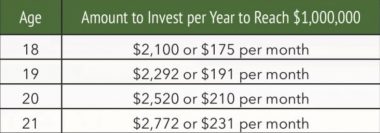Contrary to popular belief, it's not rocket science to invest in the stock market.
 Contrary to popular belief, it's not rocket science to invest in the stock market; in fact, it's actually a good idea to start investing in stock as a college student. What many students don't realize is that as long as you have money, you can invest in stock. Investing in stock allows for college students to cross an entirely new threshold into adulthood.
Contrary to popular belief, it's not rocket science to invest in the stock market; in fact, it's actually a good idea to start investing in stock as a college student. What many students don't realize is that as long as you have money, you can invest in stock. Investing in stock allows for college students to cross an entirely new threshold into adulthood.
Say you make $2,000 over the summer. What are you going to do with that money? Will you buy some new jeans? Maybe an Apple watch? What if you invested this money? If you invest it, over the span of a few years, that $2,000 could turn into $15,000. Granted, money that you invest does grow slowly over time, which makes it less-desirable for college students, but you will really see large financial gains in the future.
 Wouldn't it be great to invest enough money to eventually make $1,000,000? To the left there is a table to show how much you should invest to achieve this.
Wouldn't it be great to invest enough money to eventually make $1,000,000? To the left there is a table to show how much you should invest to achieve this.
There are many places where you can invest and buy stocks for free! Betterment, for example, allows you to open your account with no money at all. As you make periodic contributions to your account, the money is automatically invested! This is an easy way to invest as a college student, because it allows for stock investment to become less of a task when there are things like schoolwork and assignments to worry about.
In summary, if you're interested in investing, here are the steps to take:
- Open an investment account
- Invest in low-cost index funds, because they will allow you to gain money over time. You will only need one or two to get started, so don't go all out.
- Add risk gradually. Don't be nervous if the market goes down in the first few months of investing; rather, start with a balanced portfolio (60% stocks and 40% bonds). "The more bonds you hold, the less your account balance will fluctuate," (USNews).
Investing should be a habit, and the earlier you invest, the better. Money made through investments can even help students pay off student loans and help them start saving up for a family.


